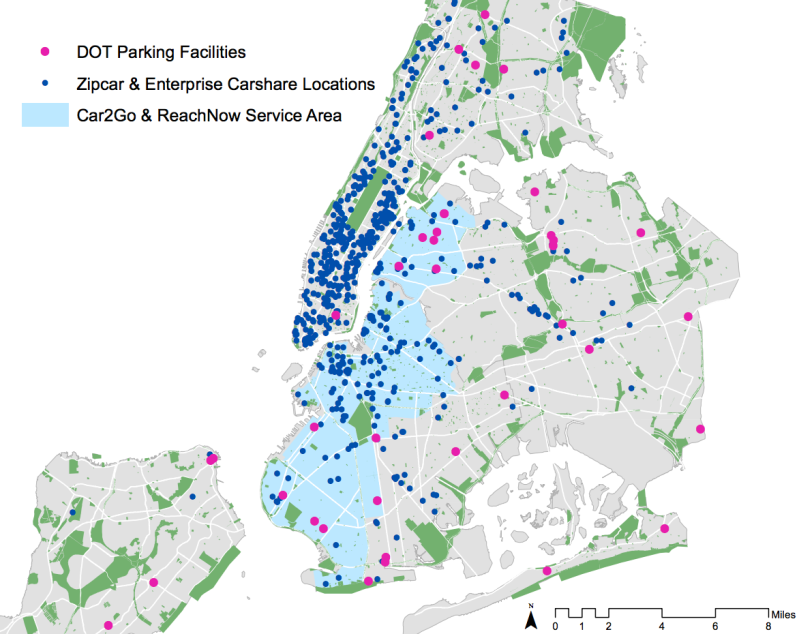DOT Will Test Out Public Parking Spots Dedicated to Car-Share

In the spring, the city plans to make 600 public parking spaces available to car-sharing companies as part of a two-year pilot project. Half of the spaces will be in municipal parking facilities and half will be on-street.
DOT Commissioner Polly Trottenberg announced the initiative at this morning’s City Council transportation committee hearing. Also on the agenda were two bills aimed at opening city-owned parking spots to car-sharing companies.
There are several players currently in the NYC car-share market. Two of them — Car2Go and BMW’s ReachNow –operate “point-to-point” models where users pick up and leave their cars at on-street parking spots. Two others — ZipCar and Enterprise — use a “round-trip” model that requires users to return their rental to a designated off-street parking spot.
So far the city has brokered arrangements with car-share companies without doing much to actively give the services a leg up. Council members who think that should change point to data from other American cities that indicates car-share can reduce car ownership. In Seattle, for example, a city study found that 14 percent of members of “point-to-point” services had given up a vehicle since enrolling.
It’s not clear whether car-share has a similar effect in NYC, where the baseline for car ownership is much lower than in Seattle, and where any curb space that opens up doesn’t last long before it’s claimed for vehicle parking — because it’s free. Because New Yorkers already make most trips without driving, it’s also not clear whether car-share will decrease or increase traffic here.
Trottenberg, who told council members she was initially skeptical of the role car-share could play in reducing car ownership, said that a pilot period will enable DOT to gauge which model or models work best here.
“We think they can really be something that will be beneficial for everyone: people who use the program, and then other people who are trying to make use of that scarce street space,” she said. “[A pilot] is going to give us a chance to do some experimentation.”
DOT also believes providing guaranteed spots in municipal garages and on-street spaces can fix some imbalances in car-share access.
Trottenberg said neighborhoods with scarce off-street parking facilities lack convenient car-share options. She pointed to Park Slope, Astoria, and Washington Heights — transit-rich neighborhoods with a “high number of households that store a private vehicles on-street and tend to use it for occasional, non-commuting purposes” — as a “natural cohort” of potential car-share users. Less transit-accessible neighborhoods like East Flatbush or Jamaica could also benefit from an increased car-share presence.
Both the proposed bills, Intro 873 from Council Member Mark Levine and Intro 267 from Council Member Rosie Mendez, have specific language spelling out terms under which car-share would use public streets and garage space, but DOT prefers to try out different methods before settling on a permanent path forward.
DOT did not go into details like how much the city will charge car-share companies for guaranteed parking, how the rules about car-share-only curbside spots will be enforced, or how the agency will assess performance. But Trottenberg did say that participating companies will “be required to share data with DOT on curb use, customer satisfaction, and mobility.”
Over the next six months or so, the agency plans to roll out an initial proposal for the pilot. “We’re ready to get feedback on the places folks would like to see [car-share], ” Trottenberg told council members.





